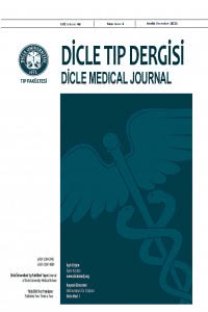Dubin-johnson sendromu tanılı bir olgu nedeniyle konjuge hiperbilirubinemiler
A case with conjugated hyperbilrubinemia diagnosed as dubin johnson syndrome
___
- 1. Dubin, in, Johnson, FB. Chronic idiopathic jaundice with unidentified pigment in liver cells; a new clinicopathologic entity with a report of 12 cases. Medicine (Baltimore) 1954; 33:155.
- 2. Sprinz H, Nelson RS. Persistent non-hemolytic hyperbilirubinemia associated with lipochrome-like pigment in liver cells: report of four cases. Ann Intern Med 1954; 41:952
- 3. Shani, M, Seligsohn, U, Gilon, E, et al. Dubin-Johnson syndrome in Israel. I. Clinical, laboratory, and genetic aspects of 101 cases. Q J Med 1970; 39:549.
- 4. Iyanagi T, Emi Y, Ikushiro S. Biochemical and molecular aspects of genetic disorders of bilirubin metabolism. Biochim Biophys Acta. 1998; 1407: 173-184.
- 5. Nishida, T, Gatmaitan, Z, Roy Chowdhury, et al. Two distinct mechanisms for bilirubin glucuronide transport by rat bile canalicular membrane vesicles. J Clin Invest 1992; 90: 2130.
- 6. Tsujii H, Konig J, Rost D, et al. Exon-intron organization of the human multidrug-resistance protein 2 (MRP2) gene mutated in Dubin-Johnson syndrome. Gastroenterology 1999; 117: 653.
- 7. Mor-Cohen R, Zivelin A, Rosenberg N, et al. Identification and functional analysis of two novel mutations in the multidrug resistance protein 2 gene in Israeli patients with Dubin-Johnson syndrome. J Biol Chem 2001; 276: 36923.
- 8. Cohen L, Lewis C, Arias IM. Pregnancy, oral contraceptives, and chronic familial jaundice with predominantly conjugated hyperbilirubinemia (Dubin-Johnson syndrome) Gastroenterology 1972; 62:1182.
- 9. Dittrich H, Seifert E. On the behavior of pigment and biligraffin excretion in a patient with Dubin-Johnson syndrome. Acta Hepatosplenol 1962; 9: 45.
- 10. Morita, M, Kihara, T. Intravenous cholecystography and metabolism of meglumine iodipamide (Biligrafin) in Dubin-Johnson syndrome. Radiology 1971; 99: 57.
- 11. Koskelo P, Toivonen I, Adlercreutz H. Urinary coproporphyrin isomer distribution in the Dubin-Johnson syndrome. Clin Chem 1967; 13: 1006.
- 12. Kondo T, Kuchiba K, Shimizu Y. Coproporphyrin isomers in Dubin-Johnson syndrome.
- 13. Seligsohn U, Shani M, Ramot B, et al. Hereditary deficiency of blood clotting factor VII and Dubin-Johnson syndrome in an Israeli family. Isr J Med Sci 1969; 5:1060.
- 14. Levanon M, Rimon S, Shani M, et al. Active and inactive factor VII in Dubin-Johnson syndrome with factor-VII deficiency, hereditary factor-VII deficiency and on coumadin administration. Br J Haematol 1972; 23:669.
- ISSN: 1300-2945
- Yayın Aralığı: 4
- Başlangıç: 1963
- Yayıncı: Cahfer GÜLOĞLU
Pediatrik toraks patolojilerinde çok dedektörlü BT’nin rolü
Senem ŞENTÜRK, Hatice Öztürkmen AKAY
Transtorasik dikiş iğnesi’ne bağlı diafragma rüptürü
TAHİR ŞEVVAL EREN, ALPER AVCI, Memduh ORUÇ, Bülent ÖZTÜRK
Sıçan Modelinde Uzak İskemik Önkoşullamanın Akciğerdeki İskemi Reperfüzyon Hasarı Üzerine Etkileri
Hasan AKKOÇ, İlker KELLE, Ebru KALE, Nihal KILINÇ
Hipofizer cüceliğe eşlik eden ektopik nörohipofiz: Olgu sunumu
İlhan KILINÇ, Deniz GÖKALP, Cihan Akgül ÖZMEN
Akut viral hepatit a olguların klinik ve laboratuar bulgularının
Mustafa TAŞKESEN, M. Ali TAŞ, Sultan ECER, A. Kadir ÖZEL, Sertan KARABİBEROĞLU
Ediz YORGANCILAR, Müzeyyen YILDIRIM, Faruk MERİÇ
Pediatrik Toraks Patolojilerinde Çok Dedektörlü BT\'nin Rolü
Senem ŞENTÜRK, Hatice Öztürkmen AKAY
Akut Viral Hepatit A Olguların Klinik ve Laboratuar Bulgularının Değerlendirilmesi
Mustafa TAŞKESEN, M. Ali TAŞ, Sultan ECER, A. Kadir ÖZEL, Sertan KARABİBEROĞLU
Transtorasik Dikiş İğnesi\'ne Bağlı Diafragma Rüptürü
Şevval Eren EREN, Alper AVCI, Menduh ORUÇ, Bülent ÖZTÜRK
Sultan Ecer MENTEŞ, Nurettin OKUR, M. Emin GÜNEL, Nilüfer OKUR, M. Ali TAŞ
